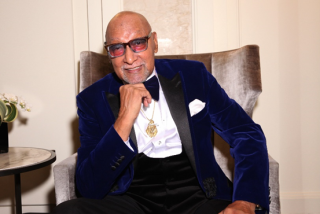Putting the Many Sides of Ellington Into Focus
- Share via
There is a brief but especially telling moment at the beginning of the PBS special “Swingin’ With the Duke: Lincoln Center Jazz Orchestra With Wynton Marsalis,” which airs tonight at 9.
Ellington, in a black-and-white film clip from an unidentified interview, says, “I got a million dreams. That’s all I do is dream all the time.”
The interviewer responds, “I thought you played piano.”
And Ellington, with the slightest smile, replies, “No, this is not piano. This is dreaming,” and begins to play a sequence of what can best be described as dreamy, impressionistic chords.
Dreaming, however, was only one aspect of the Ellington experience. The documentary, which surveys his five-decade-plus career in considerable detail, reveals how effectively he integrated his creative dreams with his vivid representations of the realities of American society in a rapidly changing century, underscoring it all with a glowing sense of optimism.
“He’s a whole American combination of the performer and the composer,” Marsalis says. “He came right out of that tradition. But the whole alienation thing of the 20th century? Duke was never part of that. That wasn’t part of his philosophy.”
Over the course of the program, which includes a wide array of interviews, period film clips, recordings and current performances by the Lincoln Center Jazz Orchestra, Ellington’s optimism, his capacity to compose music that brought dream and reality together, is a continuing theme. And he appears to have been capable of doing so almost from the very beginning of his career, clearly evidenced in such early, superbly atmospheric pieces as “Harlem Air Shaft,” “Mood Indigo,” “Black, Brown and Beige” and “Creole Love Call.”
“I don’t think anybody in the history of music, including Bach,” Marsalis says, “investigated as much varied music as Ellington did. Living in the 20th century just allowed him to come in contact with so many more different things, and they all became part of his music.”
Marsalis is not alone in his praise. Comparisons to Bach, to Beethoven and Mozart abounded in the weeks surrounding the Ellington centennial on April 29. Not only is he identified by many as the most important American composer of the 20th century, but Rob Gibson, the Lincoln Center orchestra’s executive producer and director, calls Ellington “our Shakespeare, Goethe and Cezanne.”
For all its worth, the praise is a bit belated, arriving in copious quantity 25 years after Ellington’s death. And too often overlooked in the streams of accolades is the fundamental fact that Ellington, despite his dreaming, was neither an ivory tower creative hermit nor an academic theoretician. At heart, he was a performing artist constantly under pressure to produce music for every imaginable purpose. And that, as Marsalis notes, was one of the keys to the breathtaking array of color and imagination in his 2,000 works.
In the documentary, he is seen performing in films as early as the late ‘20s, recording, rehearsing, leading his orchestra at nightclubs, concerts and dances. The music, in every location, serves a purpose--mood-evoking for the nightclub shows, filled with hard-swinging rhythms and improvising soloists for the concert performances, brisk and body-moving for the dance hall appearances.
It is here that another important key to Ellington’s uniqueness emerges: a regular, continuing ensemble. Many of his musicians stayed with the orchestra for years, and baritone saxophonist Harry Carney was with Ellington from beginning to end.
At one point in the documentary, noting the financial costs of continually maintaining his own orchestra, Ellington notes, with characteristic irony, “They make the money, and I have the fun.”
This kind of continuing, participatory relationship with an ensemble is relatively unique in the 20th century, an era in which composers more commonly tended to be separate, writing music in isolation, often for musicians they did not know.
Throughout the film, the Lincoln Center Jazz Orchestra--a brilliant ensemble with an amazing inner musical empathy--underscores Ellington’s accessibility with a set of vigorous interpretations of his music, performed for an audience of swing dancers. Fascinating as the music is for its innovative sounds and its sheer creative depth, it is equally compelling as melody and as dance music, with the energetic dancers romping through jitterbug moves echoing the ‘30s and ‘40s.
“He was one of a kind,” Marsalis says. “And it wasn’t because he did it this way or that way, because if he had done something else, then we’d be saying something about that. The fact of the matter is that it was all really based on him, on his dreams.”
*
* “Swingin’ With the Duke: Lincoln Center Jazz Orchestra With Wynton Marsalis” airs tonight at 9 on KCET.
More to Read
The complete guide to home viewing
Get Screen Gab for everything about the TV shows and streaming movies everyone’s talking about.
You may occasionally receive promotional content from the Los Angeles Times.






